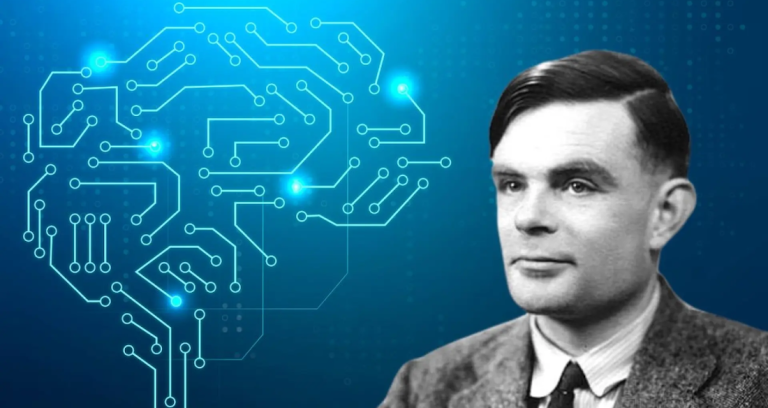
Revolutionary codebreaker’s mathematical manuscripts highlight enduring legacy of artificial intelligence pioneer
London – The scientific papers of legendary British mathematician and wartime codebreaker Alan Turing have sold for an extraordinary £465,000 at auction, demonstrating the continuing fascination with one of the twentieth century’s most influential minds.
The sale, conducted by Bonhams auction house in London on June 15, 2025, exceeded all expectations and underscored Turing’s pivotal role in shaping modern computing and artificial intelligence.
Historic Collection Surpasses All Estimates
The manuscript collection, originally estimated to fetch between £300,000 and £400,000, attracted intense bidding from collectors, museums, and technology enthusiasts worldwide. The papers span Turing’s most productive period from 1936 to 1954, including handwritten notes on his revolutionary work in computational theory, machine learning, and cryptography.
“This sale represents more than just a transaction,” said Dr. Margaret Whitfield, head of manuscripts at Bonhams. “These papers offer unprecedented insight into the mind that laid the foundation for modern computing and artificial intelligence.”
The collection includes Turing’s original calculations for what would become known as the Turing Machine, a theoretical construct that forms the basis of all modern computers. Also featured are his handwritten notes on “intelligent machinery” from 1948, predating widespread discussion of artificial intelligence by decades.
Breaking the Enigma Code Legacy Lives On
During World War II, Turing’s work at Bletchley Park proved instrumental in breaking the German Enigma code, a breakthrough that historians credit with shortening the war by at least two years. The auction included several papers related to his cryptographic innovations, though the most sensitive wartime documents continue to remain classified.
“Turing’s contributions to the Allied victory cannot be overstated,” noted military historian Professor James Richardson. “His mathematical brilliance saved countless lives and changed the course of history.”
The papers reveal Turing’s methodical approach to problem-solving, with margins filled with calculations, corrections, and insights that would later revolutionize multiple fields of study. His work on pattern recognition and neural networks appears decades ahead of its time, anticipating developments that wouldn’t gain mainstream attention until the 1980s and 1990s.
Modern Technology Giants Trace Roots to Turing
Today’s technology leaders frequently cite Turing as a foundational influence. The Turing Test, his proposed method for evaluating machine intelligence, remains a benchmark in artificial intelligence research. Major corporations investing billions in AI development can trace their theoretical foundations directly to concepts outlined in these newly sold manuscripts.
“Every smartphone, every search engine, every AI assistant
owes a debt to Alan Turing’s pioneering work”
“Every smartphone, every search engine, every AI assistant owes a debt to Alan Turing’s pioneering work,” explained Dr. Sarah Chen, director of the Computer History Museum in California.
“These papers represent the genesis of the digital age.”
The successful bidder, whose identity remains confidential, reportedly plans to digitize the collection and make it available to researchers worldwide. This decision reflects growing recognition of Turing’s work as essential reading for anyone studying computer science, mathematics, or artificial intelligence.
Tragic End Could Not Diminish Scientific Impact
Turing’s life ended tragically in 1954 when he died at age 41, officially ruled a suicide following his prosecution for homosexuality, which was illegal in Britain at the time. Despite personal persecution, his scientific output remained prolific until his death, with these papers representing some of his final contributions to mathematical theory.
The British government officially pardoned Turing in 2013, acknowledging the injustice of his treatment. This posthumous recognition has contributed to renewed interest in his work and life, culminating in films, books, and academic studies that continue to emerge.
“Turing’s persecution represents one of the great tragedies of scientific history,” said LGBTQ+ rights advocate Dr. Michael Harrison. “Imagine what additional contributions he might have made with proper support and recognition.”
Turing’s life ended tragically in 1954 when he died age 41,
officially ruled a suicide following his prosecution for
homosexuality, which was illegal in Britain at the time.
Continuing Influence on Future Generations
The record-breaking auction price reflects not only historical significance but also contemporary relevance. As artificial intelligence becomes increasingly central to modern life, Turing’s theoretical frameworks provide essential guidance for ethical and practical development.
Universities worldwide now offer courses dedicated to Turing’s theories, while tech companies regularly reference his work in patent applications and research papers. The sale of these manuscripts ensures his ideas will remain accessible to future generations of researchers and innovators.
#AlanTuring #ScientificHistory #ArtificialIntelligence #ComputingHistory
#MathematicalGenius #TuringMachine #BletchleyPark #CodebreakingHistory
TAGS: artificial intelligence, computer science, bletchley park, enigma code, turing machine,
alan turing, mathematical theory, wartime codebreaker, scientific manuscripts, auction record
Audio Summary
Alan Turing’s scientific papers sold for £465,000 at auction, far exceeding estimates. The collection included mathematical manuscripts from his groundbreaking work on computing theory and artificial intelligence. The sale reflects growing appreciation for Turing’s contributions to computer science, cryptography, and his role in breaking the Enigma code during World War II. This auction demonstrates the enduring legacy of the brilliant mathematician.